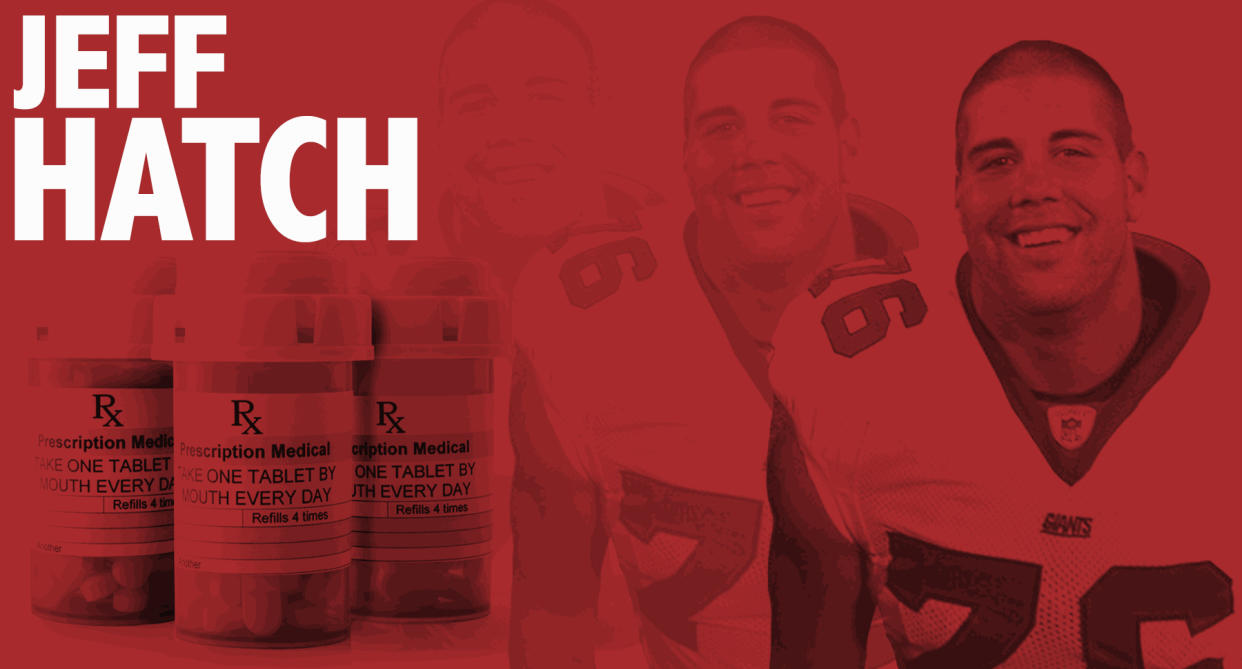The scary reality of NFL and opioids

Jeff Hatch is a retired NFL lineman. Here, he shares his story of opioid addiction with Yahoo Sports.
With another NFL season underway, some players, unfortunately, have been cut and seen their careers end as teams pared down their rosters.
It’s hard for a man who’s spent his entire life preparing for the professional ranks see his career come to a close, and making the transition back to civilian life is often extremely difficult. But there’s one aspect of this difficult transition that is too often ignored: addiction.
Many, if not most, NFL players cope with the excruciating pain during their playing careers with the help of prescription painkillers, which are easy to obtain through their teams, fellow players, doctors and other sources. Many become addicted and most don’t take advantage of whatever assistance is available during their playing careers.
Once they are cut, released or retired, many are left not only with an uncertain financial and professional future, but also with an addiction to opiates. And it’s not pretty. It certainly wasn’t for me.
After an All-American career as a lineman at University of Pennsylvania, I was a third-round draft pick by the New York Giants in 2002. I made it through camp but suffered a severe back injury my rookie season that left me on the sidelines for the entire season. I recovered enough to come back for the 2003-2004 season and earn the starting left tackle position. But by then, I was a full-blown addict.
I was released and signed a two-year deal with the Tampa Bay Buccaneers. I went through the off-season program and training camp but re-injured my back. My addiction only got worse. When I went to the doctor, he told me I needed a spinal fusion and that I should quit playing. I was only 25 years old.
“That’s not going to work for me,” was my response.
Football was all that I ever wanted to do. I had surgery but my back was too far gone and I never played a snap for the Bucs. I knew my career was over when I got hurt in Tampa. I will never forget the view looking out from behind my facemask the last time I wore my helmet and pads. It was my armor, and I knew when I took it off, I’d never put it on again.
I sank deeper and deeper into depression and addiction.
I was put into the NFL’s substance abuse program, but I was sinking fast and wanted to die. I had overdosed a few times, but rock bottom came in 2006 when I overdosed in a townhouse in Tampa and was found by my parents.
I entered treatment in February 2006, and watched that year’s Super Bowl from a Florida hospital while I detoxed. Four years earlier, I was getting drafted and hoping to one day play in that game. But there I was, nearly dead in a hospital, my career already over.
I was lucky that my family, friends and counselor were there to help me through that dark period. Many ex-NFL players don’t have that support system and far too many slip deeper and deeper into addiction once their playing days are over.
We owe them better. The NFL needs to step up and provide services to its players to ensure they have a chance at life after football. Many start to get some help while playing, but convincing a player to quit painkillers while they are playing is seemingly impossible because so many need those drugs simply to stay on the field to earn a living. The NFLPA-funded NFL Players Trust provides a substance-abuse program for retired players, but I feel its services are minimal, especially for a veteran battling an opiate addiction.
We want to believe NFL players are super-human, but they’re not. They’re very human. And they sacrifice their health to make a living that they can’t make anywhere else. Painkillers enable them to play, but you can’t be on opiates for any amount of time without getting addicted. It gets real dark, real quick.
The average NFL career is around three years. We need to educate these young men about the dangers of the prescription painkillers they take for granted while they are playing. And when they’re done playing, we need to make sure they can get the help they need.
The best opportunity to get guys well is to get them into treatment once their playing days are done. We need to help them get sober and well so they can make that transition to the next phase of their life. We lose so many guys after they retire. So many leave the game broke, chemically dependent, they get divorced, they go to jail. It’s a minefield and there’s no safety net for them.
The NFL makes billions off these players’ blood and sweat and it’s time for the league to address this problem and step up with a comprehensive substance abuse treatment program for ex-players.
We owe them that.
Jeff Hatch is the marketing director for Granite Recovery Centers.

